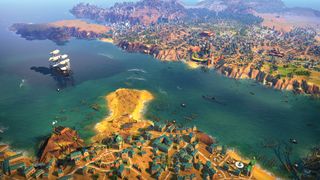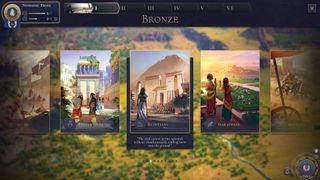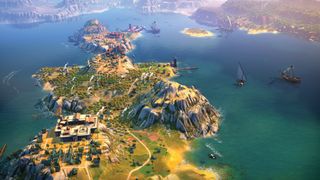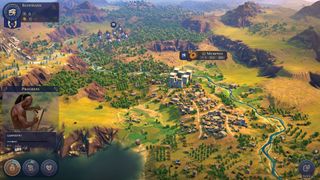Introducing Humankind, the Sega-backed Civ killer from the Endless Legend devs
Amplitude is aiming for the crown.

This preview originally ran in PC Gamer UK Issue 335. For more quality articles about all things PC gaming, you can subscribe now in the UK and the US.
On ground level, the street that houses Amplitude Studios is a uniform block of contemporary cafés, flats and office buildings. But stand on the eighth floor balcony and the first thing you’ll notice is the 1930s. The concrete dome of the Église du Saint- Esprit glints under a Parisian sun, and beyond stands a strange urban mountain, the artificial peak of the Parc Zoologique de Paris. Downwind, on a breezy day, you can smell the monkey faeces.
These are the monuments of a people who left their mark on the world. Achievements that survived assimilation into the cultures that followed, becoming part of the fabric of a nation. They are emblematic of Humankind, Sega’s new Civ rival from the makers of Endless Legend.
“The reason we created Amplitude was to make Humankind,” says studio head Romain de Waubert de Genlis. “It was a dream we had, to create a historical 4X game. We knew it was a big task. It’s the Everest of 4X, and you need to learn to climb other mountains first.”
And so Amplitude went to space, making its debut with an interstellar empire builder. Then it embraced fantasy, perfecting turn-based expansion across a hexagonal land. The studio dabbled in roguelikes and tower defence for the spin-off Dungeons of the Endless, and developed a shared universe to encompass all of its games. It established a rare reputation for storytelling in the strategy genre, and for meaningfully involving fans in design decisions. And then Amplitude signed away its independence to Sega.
“We had to find a partner that would be the big brother to protect us from distractions,” says de Waubert de Genlis. “That would give us the means to make this huge game.” The Sega acquisition has allowed Amplitude to grow in size, and to work with studios like Creative Assembly on animation and mo-cap. Humankind is a triple-A game, and it shows.
The developer is aiming for a release in 2020, but even in pre-pre- alpha, Humankind has that ambient beauty that makes a good 4X such a comfortable place to occupy for hundreds of hours. As in Endless Legend, this is no flat board but a topographic map in which altitude will influence everything from fog of war to mineral deposits and city defences, a naturally undulating landscape that takes dramatic curves from sea level all the way up to high plateaus.
The biggest gaming news, reviews and hardware deals
Keep up to date with the most important stories and the best deals, as picked by the PC Gamer team.
The prehistoric era, where the game begins, it is a green and unspoiled ‘Garden of Eden’. You can see the wildlife on the tiles beneath the feet of your tribespeople. And, at much larger scale, the mammoths you might take down as a hunting party. In this exploratory phase, you can split your tribe to cover more territory—but then stand a greater chance of being gored on a tusk, an ignoble end to the founding members of a new society.
Even at this early juncture, you have choices to make—whether to welcome and learn from the other tribes you come across, or hoard food to grow your population free from outside influence. Quickly establishing your first city might give you a headstart, but wandering the world to find wisdom could win you better starting traits, granting your civilisation stronger core DNA.
Transformation comes the moment the prehistoric era ends. It’s here that you’ll first pick a culture, from a list of ten, to embody for the next age. Perhaps you’ll be the Libyans, or the Nubians. The latter were great with money, and that trait will stick with you even as everything else changes.
“What’s crazy when you look at history is that you don’t really have a civilisation which has existed from the beginning until the end,” says de Waubert de Genlis. “What you have, in fact, is a succession of cultures that together form civilisations. They’re always merging together or reappearing as part of other cultures. In a way, all the countries that exist today are from that melting pot of history. And that’s what makes them unique.”
Build an empire

At the end of the Bronze Age, you’ll pick another great civilisation for the following era. The Nubian mastery of commerce might blend particularly well with, say, the Roman knack for empire-building. You can optimise your route through history this way, or you can potter along and enjoy your own story, seeing where circumstance takes you. A new era might hit when you’re looking to move on to another part of the map, for instance, in which case a nomadic society would suit just fine.
Over six eras with ten cultures each, you’ll shape your nation like the protagonist in an RPG, seeing what kind of people history turns you into—while always remembering where you came from.
That latter point is made easy by Humankind’s art direction, which does a marvellous job of conveying a civilisation’s journey so far. You can see each culture literally layered in the cities of your rivals—the straight streets and long roofs of modern Germany giving way to the occasional pyramid or Forbidden City-inspired palace, revealing Egyptian or Chinese ancestry. Amplitude has built a clever modular system that combines patterns and paints procedurally, so that you can tell a country’s path through the past at a glance.
Of course, that also means you can know in advance what you’re up against. Just as civilisations carry forward unique traits and buildings from their progenitors, their cultures mould their military too. The Chinese bring rocket carts, and the Romans the Praetorian Guard that can fend off far more advanced units thanks to a powerful adjacency bonus. Even a regiment is a multicultural celebration in Humankind, a greatest hits of all your identities through the ages.
Once armies clash, their units spread out across nearby tiles to create a turn-based battlefield where tactical manoeuvres can win the day. The Praetorian Guard might protect a well-placed rocket cart on high ground, but their defence could be circumvented by cavalry. That’s the idea, anyway—Amplitude isn’t ready to show a fight unfold yet. But it has assigned a dedicated dev team to battle design, which is an important break from form.
In previous Amplitude games, battles were partly automated and designed to last no longer than two minutes. The intention was to prevent military strategy from dominating every other aspect of empire-building, the way it has in most 4X games to date.
“The thing is,” laughs studio brand director Max Von Knorring, “all our players just asked for tactical battles. So we’re going for it.”
Write your own history

But Humankind is no conqueror’s playground. This is not a 4X in which you aim to fill the map with your colour by the end of the game. After all, no empire lasts forever. “You can’t win history, that’s not what happens,” says de Waubert de Genlis. “You write history. It’s not about who will be there in the end.”
Humankind is as much about being remembered as growing your territory, and victory is tied to your fame. Fame is a point system in Humankind. You acquire stars when you do anything memorable, like building a megalopolis or fighting a momentous battle. And at the end of a game, the points are totted up to determine a winner. What’s fascinating, though, is that fame can be gathered in huge amounts at any point during history, moving the focus away from the endgame.
You’ll need seven stars to advance to the next age, and the quicker you gather them, the more fame you’ll have. But there are a potential 21 stars to earn in each era, so it might make sense to go all in while you’re the most powerful empire on the board, mopping up as many stars as you can before moving to the next phase.
You can’t win history, that’s not what happens.
de Waubert de Genlis
The choice to extend the glory years of your civilisation is available during the passage to a new era, too—where you can decide not to become a new culture but instead double-down on the identity you already have. You’ll miss out on new traits, buildings, and units, but again, you’ll get more fame. The trade-off might even mean you struggle to compete with more advanced civs in the late game—but if you’ve judged it right, that won’t matter. You can watch your territory diminish afterwards as your enemies ally against you, knowing you’ve built an empire that will live on in memory.
“The Mongols had this huge empire that spanned from China to Europe to northern India,” de Waubert de Genlis points out. “And although Mongolia is a small country today, their history, their story, is amazing.” While fame is only added up at the end, a game of Humankind can effectively be won at any point in history. It’s a system that reflects the timelessness of human achievement—China and America might be the great imperialists of our modern era, but it’s the Roman Empire that we remember.
Amplitude believes that its system solves the predictability that plagues the genre’s late game. Lead designer Maxence Voleau sums up the issue, “You’re in the endgame of a classic 4X, you’ve won already, but you still need to do the last steps.” In the final turns of Humankind great empires may be dwindling, having long since traded progress for fame—and there’s always time for a new upstart to leave the largest impact on history.
Leave your mark

I wonder whether 4X fans are ready for a game that doesn’t hand them the Earth by the end of a campaign—that might see you occupying a modest corner of the map instead. Then again, PC gaming has been changed by the success of XCOM, Crusader Kings II, and Dwarf Fortress—games that have taught players to prize a brilliant anecdote over a boring victory.
“We’ll give you markers along the road,” says de Waubert de Genlis. “So you understand that yes, you’ve lost territory. Yes, you’ve lost colonies. But you’re strong, and you’re entering the sixth age as the most interesting country, with an amazing story. What you want to do is make sure you survive the last age and make sure we’re still talking about you at the end.”
It feels like a shame for the writers at Amplitude to hand the pen over to players in Humankind. The Endless universe is full of funny and fascinating cul-de-sacs. But it makes sense to have great storytellers in charge of the systemic story of history. It’s Amplitude who, at the conclusion of a game, will pick out the triumphs to remind you of—chronicling your path through the world in a way that leaves you proud.
The Endless universe is full of funny and fascinating cul-de-sacs.
“When people raze your city, you’ll be very sad,” says de Waubert de Genlis. “But some years later you’ll be able to dig it up and find all this knowledge from the past. You know you’ll come back for it.” It’s an approach that taps into a fundamental human desire for legacy. To know that, in the final counting, you made a mark.
There’s a genre neighbour looming over Amplitude as it expands outwards. In Humankind terms, Civilization is the grand old empire. “It’s a game that made us want to create this game,” says de Waubert de Genlis. “We have a lot of respect for it. But there are so many things we could do that we couldn’t wait for anyone else.”
The same reverence that has ensured Civilization’s place at the peak of 4X for decades is also its greatest restriction. While Sid Meier has made a point of passing custody of the series on, there’s no getting around the fact that Civ has a formula Firaxis must adhere to Amplitude is not bound by the same rules. “If they change a button somewhere, the players will go crazy,” Von Knorring notes. “We have the chance of having that blank page.”
Not for nothing is Humankind’s logo a handprint. It’s the studio’s play to leave its mark on the genre it loves. “It’s the reason we created Amplitude,” says de Waubert de Genlis. “I would love it to be the game we’re remembered for. That’s why we’re sending all our troops into battle, no reserves. It’s all in.”
Most Popular

